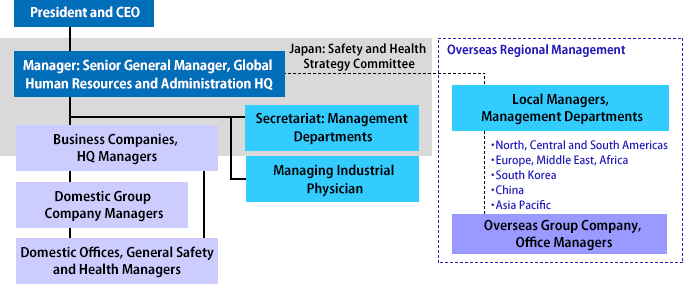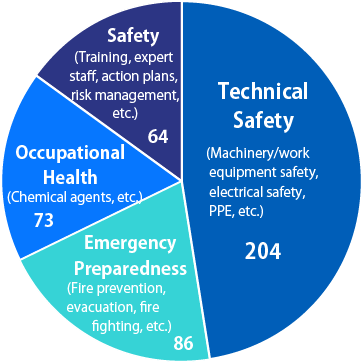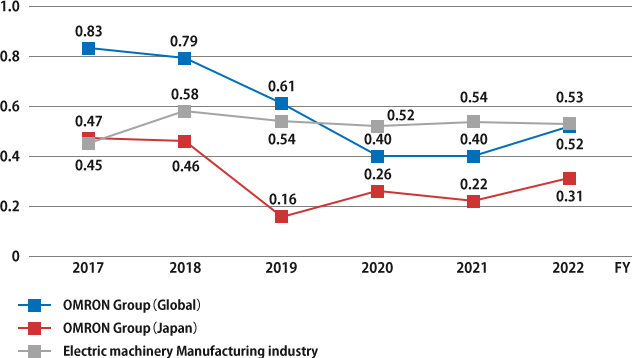Basic policy and promotion system for global management of safety and health at work
Basic Policy
OMRON Group Global Occupational Health and Safety Management System
We at the OMRON Group have identified occupational safety and health as one of the most important human rights issues. We clearly state this as our position in the OMRON Human Rights Policy. The OMRON Human Rights Policy is deliberated in Board of Director meetings, and applies not only to all executives and employees, but also to business partners, including our suppliers and distributors.
This Policy applies to all executives and employees of OMRON in order to ensure respect towards the human rights of all stakeholders involved in the OMRON Group value chain. We also expect all business partners of OMRON, including suppliers and distributors, to understand and support the content of this Policy, and will continue to work to ensure that this Policy is respected.
We declare that OMRON will carry out human rights due diligence in accordance with the United Nations Guiding Principles on Business and Human Rights and will avoid causing or contributing to adverse human rights impacts in our value chain.
To meet the above-mentioned commitment, OMRON respects human rights as those expressed in the International Bill of Human Rights, the International Labor Organization (ILO) Declaration on Fundamental Principles and Rights at Work, and the Organization for Economic Cooperation and Development (OECD) Guidelines for Multinational Enterprises. OMRON Corporation has also signed the United Nations Global Compact and upholds the 10 Principles of the United Nations Global Compact. We will respect the above internationally recognized human rights principles based on compliance with all the laws and regulations of each country and region in which we operate.
5. Occupational Safety and Health
OMRON will strive to create and maintain a safe and healthy working environment where persons working in each workplace can fully demonstrate their abilities.
To strengthen safety and health management globally, we have the OMRON Group Sustainable Conduct Policies in place covering occupational safety and health, and strive to create a safe and healthy work environment for all employees.
1.3 Occupational Safety and Health
The OMRON Group will abide by applicable laws and regulations regarding occupational safety and health in each respective country or region. The OMRON Group also respects the rights of employees to work in a safe and healthful work environment, as well as the right to refuse to work in unsafe work conditions.
The OMRON Group is mindful that safety at the workplace and the mental and physical well-being of employees and the maintenance of health and safety at the workplace is essential to enable employees to exhibit their full capabilities. Accordingly, the OMRON Group gives the utmost priority to the promotion of safety and health in all business processes, and strives to build a safe and healthful work environment.
The OMRON Group will also establish an effective risk management system for protection against potential disasters, accidents, terrorism, and other unexpected events.
3. Occupational Health and Safety
(1) Safety and Comfort in the Workplace
We must comply with all applicable laws, regulations and internal company rules relating to safety and hygiene in the workplace. We will strive to create a workplace that is safe and healthful to work in both physically and mentally.
(2) Prompt Response to Accidents and Prevention of Recurrence
If any disaster, accident, outbreak of infectious disease, environmental spill, or other misfortune occurs in the workplace, we will promptly take all appropriate measures in accordance with directions from responsible managers and others in charge. We also will actively cooperate in company efforts to limit and prevent such events in the future.
Based on the policies and the rules, OMRON formulated its Group Rules commonly applicable throughout the world, and is working to reinforce safety and health management system in each region.
OMRON Group Rules cover such provisions as the OSH (occupational safety and health) vision, promotion system (roles and responsibilities), understanding of external requirements, hazard identification, target-setting, planning, recording and reporting of occupational accidents, education and training, ability evaluation and communication, monitoring and measurement, corrective action, management review, documentation and record-keeping, effectiveness assurance, and more. The Group Rules will be broken down into regional rules applicable for each of six regions (Japan, South Korea, Greater China, Asia Pacific, Americas, and Europe/Middle East/Africa), then into rules applicable for each of the main Group companies operating in each region. In this way, OMRON is committed to strengthening its system to ensure compliance with applicable laws and regulations and the continuous prevention of occupational accidents at all workplace levels.
For purchasing, OMRON has separate Sustainable Procurement Guidelines, setting forth a Code of Conduct for suppliers. The code asks them to meet these requirements by monitoring and evaluating their behavior through self-assessment and CSR auditing, and making requests for improvement whenever necessary.
OMRON Corporation has concluded labor agreements with the following provisions regarding health and safety.
Regarding safety and health, the Company implements necessary measures to protect Union members from hazards and promote their health, and strives to improve the work environment.
The Union is allowed to share its views regarding safety and health in the workplace by submitting a proposal to the Company or bringing the matter up for discussion at the Management Council.
For the purpose of implementing necessary measures to ensure safety and health as mentioned above, each site sets up a safety and health committee.
The Company provides regular medical checkups for Union members once per year. Union members must receive medical checkups conducted by the Company.
The Company provides education regarding safety and health for employees as necessary. Union members must take education conducted by the Company.
Every person who works for the OMRON Group is responsible for ensuring health and safety in the workplace.
The Senior General Manager, Global Human Resources and Administration HQ has overall responsibility for setting global policies, establishing targets, and conducting audits as the person with the ultimate responsibility for occupational health and safety management within the OMRON Group. The presidents of overseas regional headquarters are responsible for providing guidance and support for the occupational health and safety activities of their respective OMRON Group companies. The president of each Group company is responsible for the occupational health and safety management of that company.

Throughout fiscal 2022, we will continue to improve workplace environments and develop human resources under the rules for each of the six global regions and the rules for major affiliates operating in each region.
In addition to the rules above, we adopted a management system conforming with ISO45001 at each production center. We perform PDCA under this system in line with rules related to leadership and commitment; organizational roles, responsibilities, and authority; an understanding of external requirements; prioritization through on-site risk assessment; goal setting (quantitative and qualitative); planning; competence assessment; awareness and communications; workers' compensation recording and reporting; emergency preparedness and response; monitoring, measurement, analysis, and performance evaluations; internal audits; management reviews; incidents, nonconformities, and corrective actions (e.g., accident and illness investigation of causes); and continuous improvement.
As of March 2023, 17 out of 26 production sites, or 65% sites that account for more than 80% of total production value, have acquired ISO 45001 certification. We will continue to make improvements by implementing the PDCA cycle for the OMRON Group Occupational Health and Safety Management Rules and the management system (ISO 45001) at each production site.
The OMRON Group conducts safety and health management training by position level for employees across six global regions based on health management laws, regulations, and safety management rules. We provide regular education for general safety and health managers, safety and health managers, and safety and health promoters by role. We also provide education for new employees and newly appointed managers by level. We provide special training required for each job position and stipulate/implement risk assessment training for operating the management system at each production center. In fiscal 2022, a cumulative total of 35,555 employees in Japan, Greater China, South Korea, and the Asia-Pacific region participated in safety and health training programs as part of efforts to strengthen ISO management systems.
We have also developed a collection of educational content for each global region according to the risks and hazards in the workplace. We encourage training through short e-learning and video learning programs, endeavoring to prevent risks in a timely manner.
The OMRON Group strive to strengthen mechanisms to understand changes in safety-related laws and regulations at production plants and provide countermeasures to ensure compliance with safety and health regulations. We conduct legal assessments for compliance with occupational safety and health laws and regulations using an outside safety and health consulting firm, and we strive to ensure a state of legal compliance in conjunction with environmental impact assessments.
Between 2017 and 2020, we evaluated the legal compliance status of 15 domestic and 13 overseas sites. The results of our investigations revealed a total of 427 noncompliance issues. We prioritized these issues according to the degree of risk and implemented corrective measures. We share the results of these measures across Japan and overseas as information for safety considerations. In this way, we tie these measures to disaster prevention in each region and production center.

Risk of Serious Bodily Injury
Enhance Safety/Protection Functions
Risk of Long-Term Lost Workdays
Improve Carrying and Repetitive Movements
Risk of Fire or Serious Illness
Understand and Control Risks
Risk of Fracture Injury
Check Facility Safety (on-site)
During fiscal 2022, we had conducted third-party assessments (legal assessments) focusing on compliance with safety and health laws and regulations at ten production sites in Japan, China, the Americas, Europe, and the Asia-Pacific region, including two sites that were postponed in the previous fiscal year due to anti-infection measures related to COVID-19. After identifying risks, we planned safety measures for correction and improvement. Throughout fiscal 2023, we will continue to conduct legal assessments at our production centers, focusing on risk management, not only to comply with laws and regulations, but also to avoid or minimize safety and health risks and losses arising from risks.
The OMRON Group has set a goal of zero serious accidents.
In fiscal 2022, we experienced zero fatal accidents globally for employees or contract employees. We did experience 31 lost-workday injuries for employees globally (including seven in Japan). There were 11 lost-workday injuries for contract employees globally (including four in Japan). We investigated the causes of each case, eliminated unsafe actions and operations, and implemented safety measures for machinery, equipment, and related operations management.
To reduce the frequency rate of lost time injuries, the OMRON Group relies on regional management companies to monitor the occurrence of occupational accidents among employees and contract employees (temporary employees and employees of contractors on premises) at all global affiliates. In 2022, the employee lost-workday injury frequency rate was 0.52 globally. In Japan, the rate was 0.31, lower than the National Electrical Machinery and Equipment Manufacturing Industry average of 0.53 (Japan). The lost-workday injury frequency rate for contract employees was 0.63 globally and 0.49 in Japan. We will continue our efforts throughout 2023 to improve the lost-workday injury frequency rates globally for employees and contract workers.

| Type of Occupational Accidents | Number of Cases and Number of Days | |
|---|---|---|
| Occupational Accidents | Injuries with required days off resulting from occupational accidents | Global: 31 people of which, Japan: 7 people |
| Number of days off | Global: 325 days of which, Japan: 140 days |
|
| Commuting Accidents | Injuries with required days off resulting from commuting accidents | Japan: 11 people |
| Number of days off | Japan: 79 days | |
| Occupational Fatalities | Global: None of which, Japan: None |
|